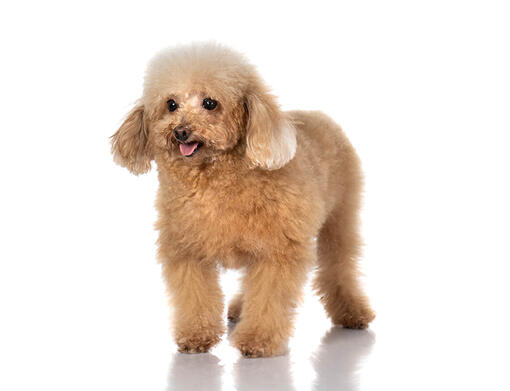
Toy Poodle
The Toy Poodle dog is a noble-looking dog with a slender muzzle and long neck. The coat is profuse, curly and is often styled, and comes in a variety of shades, including blues, greys, silvers, browns, apricots and creams – see the breed standard for full details. The adult should be below 28cm in height and weighs no more than 4.5kg.
The need-to-know
- Dog suitable for non-experienced owners
- Basic training required
- Enjoys gentle walks
- Enjoys walking half an hour a day
- Little toy dog
- Minimum drool
- Requires grooming daily
- Hypoallergenic breed
- Chatty and vocal dog
- Guard dog. Barks and alerts
- Great with other pets
- Great family dog
Personality

This is a lively and affectionate dog, who can make the most wonderful companion. He can be a good guard dog, announcing visitors, but is generally good-tempered. Toy Poodles are unusually sensitive to vocal intonation, and respond well to training. Children should be trained to handle these small, delicate dogs carefully, though.
History and Origins

This small Poodle size was known to exist at least 500 years ago. During the 17th and 18th centuries the Poodle dog breed became a favourite with the nobility, who wanted dogs smaller than the miniature variety and so the Toy Poodle dog was developed. The name 'Poodle' came from the German for 'pudel' (meaning 'to splash in water', as the Standard (from which the Mini and Toy Poodles descended) was a highly regarded water-retriever.
Nutrition and Feeding

Toy dogs have a fast metabolism, meaning they burn energy at a high rate, although their small stomachs mean that they must eat little and often. Small-breed foods are specifically designed with appropriate levels of key nutrients and smaller kibble sizes to suit smaller mouths. This also encourages chewing and improves digestion.
Exercise

This is a fairly active breed that likes to get out on walks and particularly enjoys games. It is a good idea to enrol in some sort of activity so that the mind is stimulated along with the body. Poodles can do well in obedience, agility and most dog sports.
Other Information

Health and common issues
Like many small breeds, the Toy Poodle can suffer from kneecaps that may temporarily slip out of place (luxating patellas). They are also prone to a hip condition and an inherited eye disorder that should be tested for.
Best family dog breeds
While many dogs are traditionally thought of as being good with children , all dogs and children need to be taught to get on with and respect each other, and be safe together. Even so, dogs and young children should never be left alone together and adults should supervise all interactions between them.